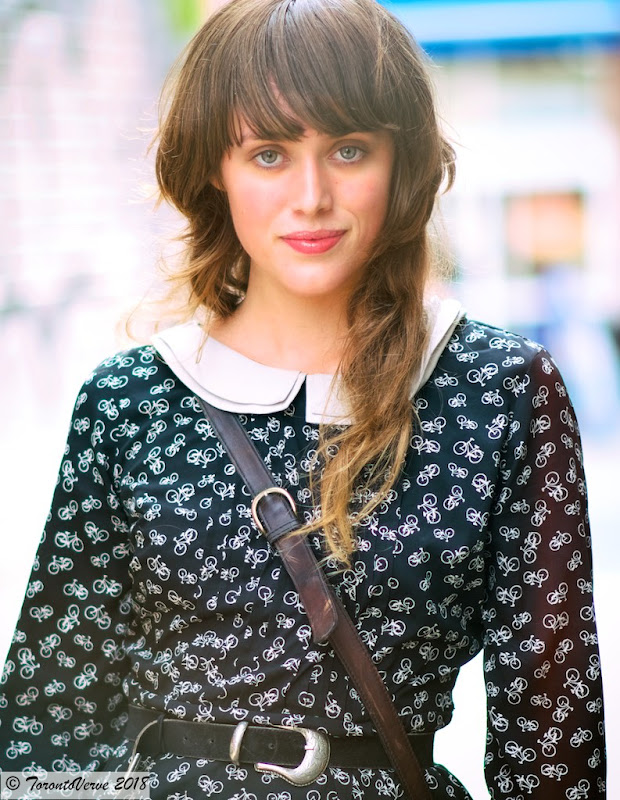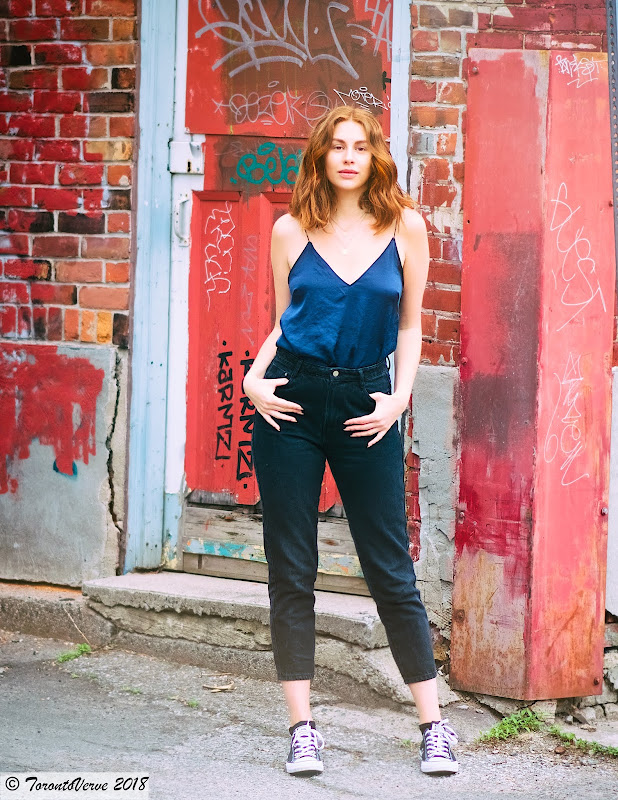“It’s Halloween. Everyone is entitled to one good scare.” *
I love horror movies. There’s something thrilling about being terrified in the safety and comfort of my living room. I had the pleasure of talking to Alexandra West, the co-host of the popular podcast
“The Faculty of Horror” and author of “Films of the New French Extremity: Visceral Horror and National Identity". She shares her thoughts about women in horror and more.
TorontoVerve: Why do you think some of us like to be scared?
Alexandra West: I think it’s because so much of pop culture is happy endings and there’s nothing wrong with that, but I think that there’s an inherent darkness to the world. You have light and dark. I think horror films give us a safe way to explore those things. When you get to encounter horror as a fan, you’re entered into this whole new world with a life and death struggle and that’s really vital to a lot of people.
TV: What scares Alexandra West?
AW: Ghost ladies. I don’t know if I really believe in ghosts, but any kind of ghostly female figure shrouded in darkness really scares me. Also, the notion of being truly alone like when you’re lost in a house or a city. We rely so much on community and the people around us — so if something bad happens, we might be safe. But if you’re alone in the woods or if you’re looking for the Blair Witch, that’s terrifying to me.
TV: You once said when you discovered horror at the video store it was like discovering your people. Can you explain?
AW:
I loved culture or the idea of culture when I was a kid and I hadn’t
found a place where it really made sense for me to fit in. So when I
found horror movies, they spoke to me so deeply. I loved being scared. I
loved the characters. I loved the tropes and themes. Later on in life, I
really started finding my people who are near and dear to me through
horror.
TV: Which Final Girl (the last surviving woman in a horror film) do you relate to the most?
AW:
She’s my favourite and, as I get older, I relate to her more and more:
Sydney Prescott from the
Scream franchise. I kinda grew up with that
character. She’s smart and she’s strong. She’s confused and pissed off,
but a good friend. She’s got a lot of conflict in her and a lot of
unresolved issues. That’s what really drives the whole
Scream franchise.
I think because she’s a really multi-faceted character, I respond to
her.
TV:
In your book, you mention that France has rejected New French Extremity
films because they’re a shameful reflection of its shady World War
II past. How much of your perception of France has changed after
researching its history and New French Extremity?
AW:
It changed quite a bit. I consumed a lot of New French Extremity films
and the more research I did, I learned that there wasn’t a big horror
movement in France. I didn’t have the best high school history teacher
so I had to teach myself French history from the ground up. I learned
that France sought to cover up many of its atrocities. France has been
marketed to us in a very cheesy way. You can’t go to a Winners or a
Marshall’s without seeing these tacky boxes with the Eiffel Tower all
over them. There are some amazing and beautiful things that happened in
France, but there’s also so much darkness and I don’t think [the French]
like to acknowledge that. Everybody was shocked with the Charlie Hebdo
shooting. There’s such a long history of terrorism in that country. I
think they’ve spent so long covering it up that it felt like New French
Extremity was the thing that had to break through.
TV: You wrote the book in 9 months. What does binge watching New French Extremity over and over again do to your state of mind?
AW:
My mom said that I looked like shit. [Laughs] It made me really
anxious, sad and frustrated. The fact that these filmmakers were
constantly putting themselves out there. They really were. They were
screaming: “There’s some fucked up shit going on!” They were addressing
it in a very visceral way. I was also reading reviews of them. While
they were beloved and accepted in the horror community, mainstream film
criticism hates them.
TV:
I’m a big fan of "The Faculty of Horror" podcast hosted by you and Andrea
Subissati. What I especially love about it is how you unpack horror
films from an academic point of view. You guys validate horror films
which don’t get much love from cinephiles or society in general. What
overall response do you get from people outside the horror community
when they discover your affection for horror?
AW: A lot of
people are very shocked. I think they assume all horror fans look like
Elvira and Vincent Price. There’s this immediate reaction — either they
think it’s kind of cool or they say, “I hate horror films!” And I tell
them: “That’s nice, but I didn’t ask.” There’s a kind of judgement,
but I think that’s what a lot of horror fans have become used to. If you
love horror, then you understand that most people are going to dismiss
you for it. I’ve accepted that.
TV: Despite its racist overtones,
I have a fondness for Gone with the Wind. I just have to get over the
mammie images and "silly darkie" references, which were normal for its
time. Horror -- especially in the 70s and 80s -- hasn’t always been kind
or respectful to women. As a feminist, did you or do you have an
awkward time watching some of these horror films?
AW: Oh, yeah.
Horror is interesting because one of the reasons I love it so much is it
often presents really dynamic female leads. You’ve got Sydney Prescott
and the women from
Black Christmas. You can name anything and there’s a
great female character.
Friday the 13th Part 7 has a very strong final
girl in Tina who’s the telekinetic Carrie-esque figure who takes down
Jason for a brief period. She’s an interesting character, but sometimes —
even in the same scene — you get these horrible women who are just
after money and sex. They’re just evil people. It’s become part of
consuming culture as a woman. You’re going to have terrible portrayals
of women even in films marketed towards women — like the
Sex and the City movies. It’s kind of gross the way some of the women are portrayed.
There are points where I decide to engage with it and there are points
where I have to check out. Yeah, I know that these are some bad female
representations, but this is a fun movie. I think of it kind of like a
light switch. Most of the time I have it flipped on, but if I’m having a
chill evening, then I could turn it off and enjoy it.
 TV: What does it say about our society if audiences are rooting for the killers in horror movies?
TV: What does it say about our society if audiences are rooting for the killers in horror movies?
AW: I think it goes back to your last question with these terrible portrayals of young kids. In a lot of the
Friday the 13th and
A Nightmare on Elm Street films, the kids are really vapid, uncaring and selfish. They’re kind of like the bullies who pick on the horror nerds so you’re like, “Fuck yeah, Freddy. Go get them.” When in reality, there are facets to every person and you probably shouldn’t be rooting for even the bully to get it in the end. I think there’s such a toxic masculinity that feeds into those portrayals of Jason and Freddy. They are these figures that cut down youth and if the kids are weird or different, all the better. I don’t love that bombastic masculinity that kind of overtakes that love of horror. It feels very exclusive. Women don’t get to play unless they dress up as sexy Freddy Kruger at conventions.
TV: I learn a lot of survival tips from horror films. The Texas Chainsaw Massacre taught me to avoid exploring in dark woods and Irreversible taught me to not walk alone in poorly lit tunnels. What survival tip have you learned from horror movies?
AW: I go back to one of my favourites: always release the safety lock of a gun. I held a gun in a staged combat class and I did not like it, but if I need to hold a gun, I will remember to look for what I think is the safety and turn it off.

TV: Which horror films can fashionistas watch to find some really cool fashion inspiration?
AW: I think Dario Argento’s
Suspiria — the entire aesthetic of that movie is beautiful, but I have a really big love for 70’s fashion.
Suspiria provides a great balance between over the top and standard fashion. Francis Ford Coppola’s
Bram Stoker’s Dracula has some of the most beautiful costumes ever committed to film. If you want some fashion eye porn, you can really be served by that film. When I think of stylish horror, I always think of Aaliyah in
Queen of the Damned. She’s got the head dress and the bikini top. It’s like the most bad ass version of Princess Leia’s gold bikini.
TV: How will you be celebrating Halloween?
AW: I will probably be at the
Rue Morgue Halloween party. It’s on the Saturday before Halloween at the Velvet Underground. I still have to figure out my costume for that. Usually on Halloween proper, I’m a big fan of staying in and watching some horror films. I try to find something new that I haven’t seen before. Last year, I watched
House (Hausu) for the first time and it did not disappoint. I don’t know what I’m going to watch this year, but I’m thinking about it. We shall see.
TV: What’s making you happy now?
AW: Seeing more women take on roles in different positions in the horror community. Andrea just became the Executive Editor of Rue Morgue earlier this year. Films like
XX (an anthology horror film directed exclusively by women) are really cool. I recently saw
Tragedy Girls and that has some really great portrayals of female friendship. I think in the midst of all of these Harvey Weinstein — I’m sure very factual — allegations, it feels like you’re defeated when you see more and more women coming forward. You think, “How has this been happening for so long?” But you kind of know why it’s been happening. I think of the women who are actively working in the industry and making change and making space for different people — whether it’s a male directed film with great female characters or women behind the camera or behind the computer for magazines. Women have so many different voices and they are starting to make things more inclusive for everyone in the horror community. People with different sexual orientations, people of colour and women can enjoy their horror fandom together. We’re all weirdos.
* Quote from the film Halloween (1978)
Follow Alexandra West on Twitter, Facebook & Instagram.
Pre-order Alexandra's newest book "1990's Teen Horror Cycle: Final Girls and the New Hollywood Formula".


















































